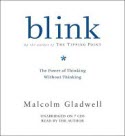Malcolmn Gladwell's Blink: Your First Impression Is Usually Correct in Complex Situations
 We're taught to stop and think carefully before making an important decision. But in Blink, Malcolm Gladwell finds that in complex situations, our initial two-second judgments are often more accurate than judgments derived from lengthy, painstaking analyses.
We're taught to stop and think carefully before making an important decision. But in Blink, Malcolm Gladwell finds that in complex situations, our initial two-second judgments are often more accurate than judgments derived from lengthy, painstaking analyses.
Although Gladwell is careful to explore situations where two-second judgments fail, the most interesting scenarios are where rapid cognition succeeds. It contradicts reason to think that a two-second judgment could be more accurate than a carefully made analysis, but in many cases it is.
Knowing too much -- learning too much information, processing too many variables -- often backfires. It makes our judgment more prone to error.
Gladwell says we make lightening-fast decisions from our unconscious. We don't understand all the variables that contribute to the unconscious' judgment, and in fact we can't understand the unconscious' process if we try.
Snap judgments and rapid cognition take place behind a locked door (51).
However, in some instances, our two-second judgment leads us astray, particularly when the following is involved:
- Gender
- Race
- The wrong context/environment
- High states of stress/arousal
- Visual information
He explores dozens of psychology experiments that show both successes and failures from rapid cognition.
In deciding whether to trust our split-second judgment, Gladwell says a good rule of thumb is to use our unconscious when making decisions in complex situations, where there are many variables. In contrast, when making decisions about straightforward problems, where fewer variables exist, use careful analysis.
So his advice is just the opposite of conventional wisdom: if the situation is easy, gather lots of information and be careful before making your decision. If the situation is complex, go with your two-second instinct.
In the Afterward, he quotes Freud showing agreement with this strategy. Freud says,
When making a decision of minor importance, I have always found it advantageous to consider all the pros and cons. In vital matters, however, such as the choice of a mate or a profession, the decision should come from the unconscious, from somewhere within ourselves. In the important decisions of personal life, we should be governed, I think, by the deep inner needs of our nature. (268)
The unconscious, the "somewhere within," is responsible for our split-second, instinctual judgment.
How I'm Applying Blink
Reading this book made me more inclined to trust the quick, instinctual judgments I make about writing. When I write a new post, essay, blurb, or other text, I usually have an immediate gut feeling as to whether it's good or bad. Sure I could tear apart my judgment by analyzing all the elements: Does it have a thought-provoking idea, evidence for the assertion, transitions between paragraphs, coherence? But really this careful analysis is only an attempt to understand or justify the initial instinct.
When I was a composition teacher, I immediately knew, after reading a student essay, whether it was good or bad. It only took about one or two paragraphs to make this judgment. Of course in my end comment, I had to justify my judgment, writing comments related to qualities I mentioned above. But I never proceeded through a list of characteristics to measure an essay before arriving at a conclusion of its worth.
That's because an essay is a complicated situation with a variety of complex variables, strategies, and rhetorical techniques. How do you quantify or evaluate insight? style? flow? brilliance? awkwardness? Except for the logic of the argument, much of the evaluation is generated from our unconscious. We don't consciously move through a specific evaluation algorithm to arrive at our conclusion. We just know -- in about 2 seconds -- whether the essay is good.
The application for writing? If your split-second judgment says this prose isn't good, scrap it. Don't question your instinct. Start over or rewrite it until you immediately feel it is good.
About Tom Johnson

I'm an API technical writer based in the Seattle area. On this blog, I write about topics related to technical writing and communication — such as software documentation, API documentation, AI, information architecture, content strategy, writing processes, plain language, tech comm careers, and more. Check out my API documentation course if you're looking for more info about documenting APIs. Or see my posts on AI and AI course section for more on the latest in AI and tech comm.
If you're a technical writer and want to keep on top of the latest trends in the tech comm, be sure to subscribe to email updates below. You can also learn more about me or contact me. Finally, note that the opinions I express on my blog are my own points of view, not that of my employer.

